Details
centimeter level GNSS module based on ZED-F9P for Raspberry Pi
multi-band RTK technology, centimeter level accuracy positioning in seconds, concurrent reception of 4 GNSS systems,
high update rate with minor drifting, low power consumption, outstanding ability for anti-spoofing & anti-jamming

This is a precise centimeter level Raspberry Pi GNSS HAT based on ZED-F9P. It provides features like multi-band RTK with fast convergence times, high update rate, moving base RTK mode support, concurrent reception of 4 GNSS systems, augment positioning systems support, accurate & fast positioning with minor drifting, and outstanding ability for anti-spoofing & anti-jamming.
By simply attaching it onto the Pi, it is fairly easy to enable GNSS capability for your Raspberry Pi.
- Standard Raspberry Pi 40PIN GPIO extension header, supports Raspberry Pi series boards, Jetson Nano
- multi-band RTK with fast convergence times, centimeter level accuracy, high update rate
- Supports Moving base RTK mode, enabling terminal precise navigation and centimeter level accuracy
- Supports concurrent receiving 4 GNSS constellations (GPS, BeiDou, Galileo and GLONASS), and still retains low power consumption
- Augment systems support, including SBAS, QZSS, IMES, D-GPS, improving the positioning performance of service location
- A-GNSS (Assisted GNSS) support, reducing the first positioning time when powered up, improving the acquisition sensitivity
- Features -167dBm navigating sensitivity and outstanding ability for anti-spoofing & anti-jamming, supports geo-fencing
- Supports U-Center, an easy way to config the module
- Onboard battery holder, supports ML1220 rechargeable cell, for preserving ephemeris information and hot starts
- 4x LEDs for indicating the module operating status
- Comes with development resources and manual (examples for Raspberry Pi/Jetson Nano/Arduino/STM32)
| GNSS specifications | |||||||
|---|---|---|---|---|---|---|---|
| ZED-F9P | concurrent receiving | ||||||
| GPS GLONASS Galileo BeiDou |
GPS GLONASS Galileo |
GPS Galileo |
GPS GLONASS |
GPS BeiDou |
GPS | ||
| Frequency band | u-blox F9 platform GPS L1C/A L2C, SBAS, QZSS, GLONASS L1OF L2OF, BeiDou B1I B2I, Galileo E1B/C E5b |
||||||
| Max navigation update rate | RTK | 8Hz | 10Hz | 15Hz | 15Hz | 15Hz | 20Hz |
| PVT | 10Hz | 12Hz | 20Hz | 25Hz | 25Hz | 25Hz | |
| RAW | 20Hz | 20Hz | 25Hz | 25Hz | 25Hz | 25Hz | |
| RTK convergence time | <10s | <10s | <10s | <10s | <10s | <30s | |
| Time-To-First-Fix | Cold starts | 24s | 25s | 29s | 26s | 28s | 29s |
| Hot starts | 2s | 2s | 2s | 2s | 2s | 2s | |
| Aided starts | 2s | 2s | 2s | 2s | 2s | 2s | |
| Positioning accuracy | PVT | 1.5m CEP | |||||
| RTK (horizontal and vertical) | 0.01m+1ppm CEP | ||||||
| Sensitivity | Tracking and navigating | -167 dBm | |||||
| Re-acquisition | -160 dBm | ||||||
| Cold starts | -148 dBm | ||||||
| Hot starts | -157 dBm | ||||||
| Velocity accuracy | 0.05 m/s | ||||||
| Heading accuracy | 0.3 degree | ||||||
| PPS accuracy | RMS | 30ns | |||||
| 99% | 60ns | ||||||
| Jamming | ±11ns | ||||||
| PPS frequency | 0.25Hz ~ 10MHz (configurable) | ||||||
| Operational limits | Acceleration (max): 4g | ||||||
| Altitude (max): 50000m | |||||||
| Velocity (max): 500m/s | |||||||
| Other specifications | |||||||
| Communication interface | USB, UART (4800~921600bps, 9600bps by default), I2C (max 400KHz), SPI (5MHz) | ||||||
| Protocol | NMEA 0183 Version 4.10, UBX, RTCM 3.3 | ||||||
| Power supply | 5V | ||||||
| Overall current | < 120mA@5V (continue mode) | ||||||
| Module current | 130mA@3V max (tracking status) | ||||||
| Operating temperature | -40℃ ~ 85℃ | ||||||
| Dimensions | 65mm × 30.5mm | ||||||
Compatible with Raspberry Pi series boards, Jetson Nano

& high update rate
used as either reference station, or positioning terminal
By setting up continuous running reference stations on ground known fixed coordinates using the ZED-F9P module, or by paid RTK base station enhanced services, transmitting GNSS observed value to ZED-F9P terminals which uploading rough positioning data, the terminals, with errors like multipath refraction, is able to calculate observed value in real time, for centimeter level positioning in seconds.
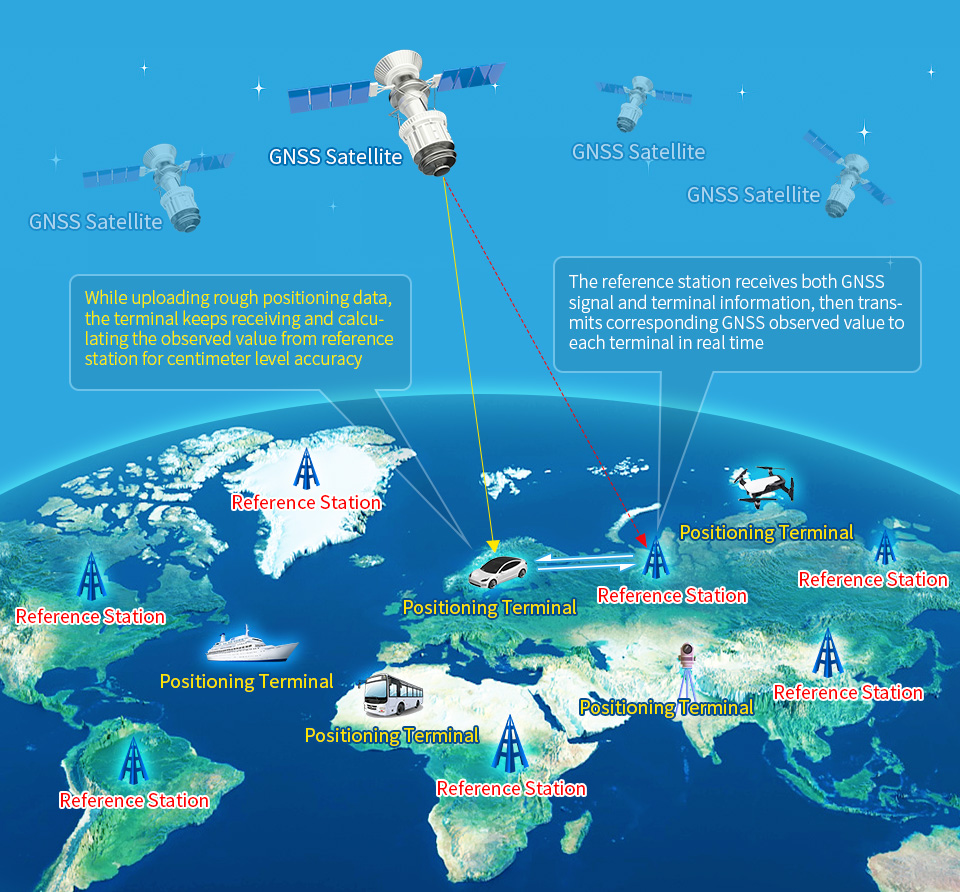
Moving base RTK (MB RTK) is a function that concurrently uses two or three ZED-F9P modules to output precise deflection angle, altitude, centimeter level positioning coordinate, or attitude angle. It is suitable for applications like vessel heading determination, heavy machinery moving control, agriculture vehicle heading control, and so on.

Supports GPS, Beidou, Galileo, GLONASS
and still retains low power consumption

Augment system is aimed at improving the accuracy, completeness, reliability, and availability of positioning and navigation
Supports augment systems including SBAS, QZSS, IMES, D-GPS

Features -167dBm navigating sensitivity, outstanding ability for anti-spoofing & anti-jamming

an easy way to config the module
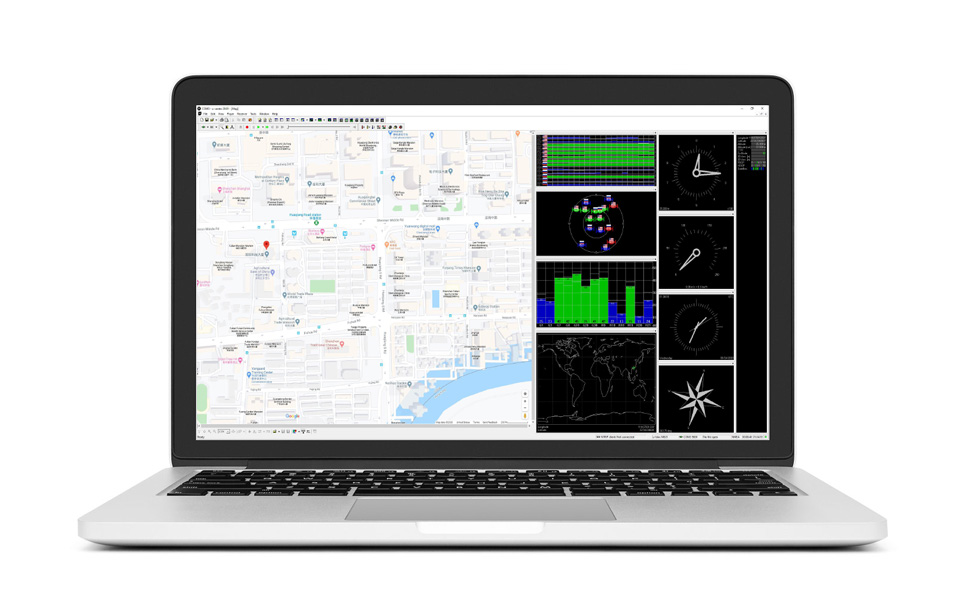
Ideal for intelligent driving, precise agriculture, fleet management, asset tracking, GIS app...

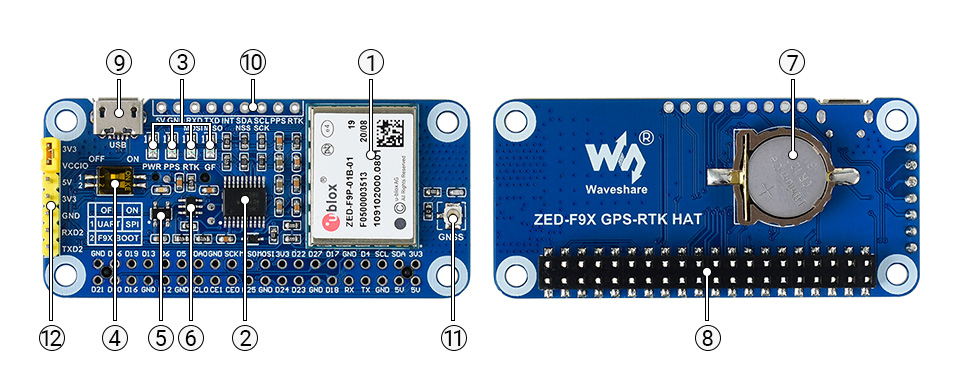
- ZED-F9P module
- TXS0108EPWR voltage translator
- Status indicators
PWR: power indicator
PPS: GPS status indicator
RTK: RTK status indicator
GF: geo fencing status indicator - DIP switch
1: UART/SPI selection
2: firmware upgrade - RT9193-33 power chip
- NDC7002N voltage translator
- Battery holder
supports ML1220 rechargeable cell, for preserving ephemeris information and hot starts - Raspberry Pi GPIO header
for connecting with Raspberry Pi - USB port
- UART, I2C interface
for connecting with other MCUs - GNSS antenna connector
- UART peripheral and IO voltage level selection jumper
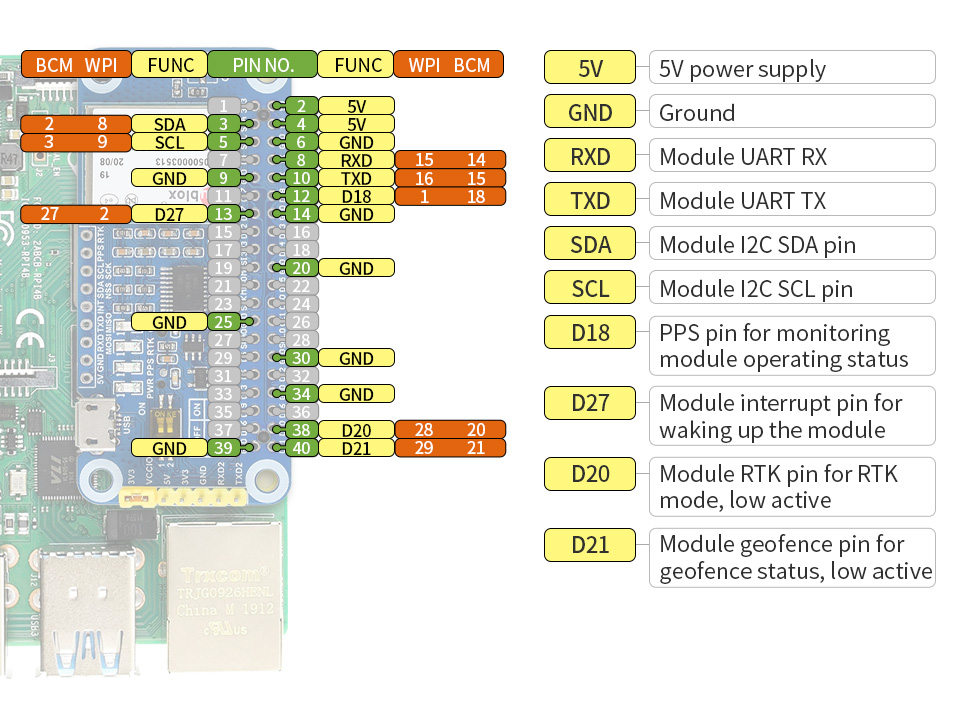
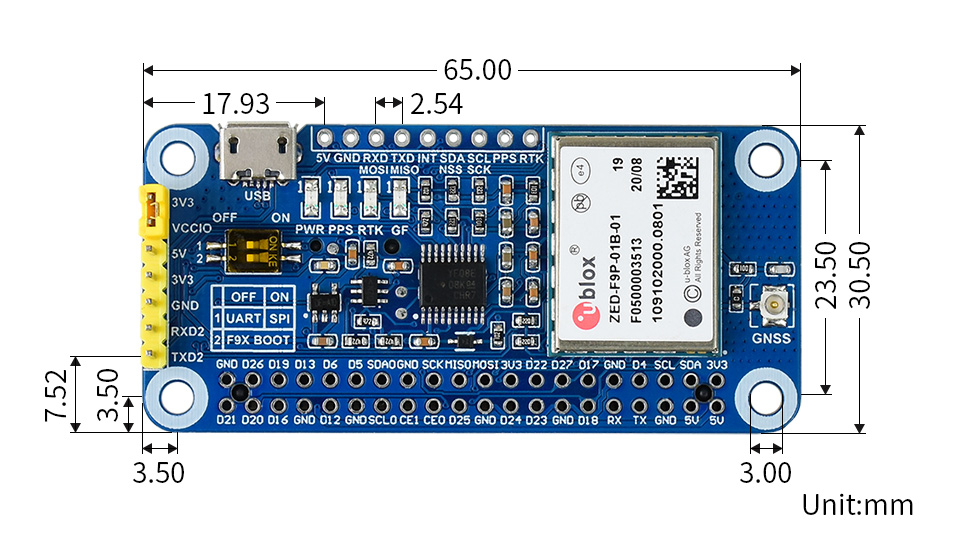

* Resources for different product may vary, please check the wiki page to confirm the actually provided resources.
Weight: 0.292 kg
Quick Overview
 Warning: battery inside.
Warning: battery inside.
- ZED-F9P GPS-RTK HAT x1
- Multi-band antenna x1
- USB-A to Micro-B cable x1
- Screws pack x1
- 2x20PIN female header x1



